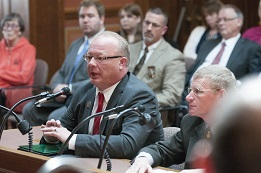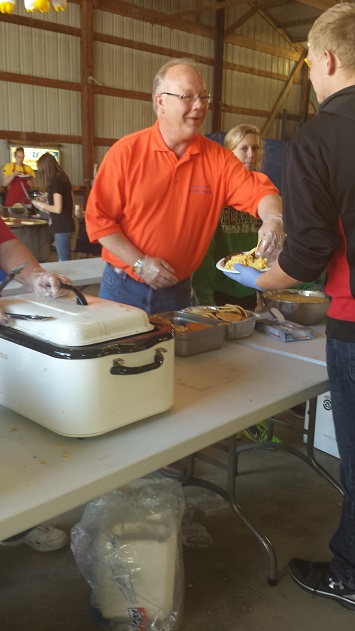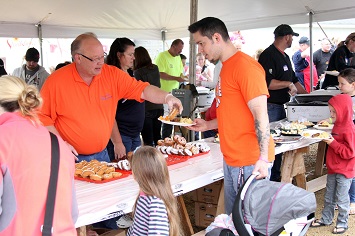Passage of Ambulance
Licensure Bill AB249

On
June 9th, the State
Assembly passed legislation I authored that enables timely emergency
response across state lines. AB249 is the first bill that I authored.
Rep. Novak Commends the Passage of Ambulance Licensure Bill
I was very pleased with my legislative colleagues when the state Assembly
and Senate both passed this bill. The bill addresses an interstate
license reciprocity concern along the Wisconsin/Illinois state line where
ambulance services may be unnecessarily delayed.
In medical emergencies, time is of the essence. When a life is on the line,
citizens shouldn’t have to wait because of government red tape. At the
request of concerned constituents, I brought forward this bill to make sure
that emergency services can be delivered in a timely fashion”.
The issue was first brought to light after the state Department of Health
Services determined that because of a licensure difference between the two
states, an ambulance from Illinois cannot provide service in Wisconsin –
even if it was the closest responding unit.
There are already real world examples of lives being placed in jeopardy
because of the licensure disagreement. This legislation provides a narrow
exemption to current requirements and allows an ambulance service provider
licensed in another state that make ten or fewer patient transports per year
that originate and terminate in Wisconsin.
This bill takes a meaningful step toward working to provide timely emergency
services for southern Lafayette County. The health and safety of our
communities shouldn’t be jeopardized because of government paperwork.
Recently, Lafayette County Sheriff Reg Gill testified in support and
answered questions before the joint hearing of the state Assembly Committee
on Health and the state Senate Committee on Health and Human Services.
The bill was passed unanimously by both the Senate and Assembly, and will
now go to the Governor’s desk for his signature.
New Member of the State
Historical Society Board of Curators
Recently
Appointed to the Wisconsin State Historical Society Board of Curators
Did you know that the 51st Assembly District is home to a number of state
historical treasures?
Earlier this
week, I was thrilled to announce my recent appointment to the State
Historical Society Board of Curators. I was appointed by Speaker Robin
Vos to represent the state Assembly on the Board. The Wisconsin Historical
Society helps people connect to the past by collecting, preserving and
sharing stories. It promotes a wide appreciation of American heritage;
highlighting the collection, advancement, and spreading of knowledge of the
history of Wisconsin.
I’m proud to have been appointed to the Historical Society Board of
Curators, it’s an honor to belong to such a storied organization that
connects people to the past. The Historical Society is the home to our
state's memory and our foremost storyteller. Southwest Wisconsin
includes many historically significant places from the first state Capitol,
the birthplace of Wisconsin’s territorial government, and Wisconsin’s oldest
courthouse.
The Wisconsin Historical Society was founded in 1846, two years before
Wisconsin became the 30th state. It is also ranked as one of the
largest, most active, and diversified state historical societies in the
nation.
Celebrating June as Dairy Month
It's no wonder
the dairy industry chose June, a month that provides perfect summer days as
the ideal month to celebrate all foods dairy, and the dairy farms that make
it possible. There are few things I enjoy better than a nutritious and
refreshing glass of cold milk. Providing calcium, potassium, vitamin
A, and the protein to keep us going through the day, milk is a great choice
for the active days of summer. More enjoyable than that, are the foods
produced from milk; the cheese over our grilled burgers, or that scoop of
ice cream for a nice summer dessert.
Wisconsin's
dairy industry is a major economic contributor to local communities.
The cows you see in Wisconsin's countryside have a significant impact on
strengthening local communities. Each of Wisconsin's more than 1.2
million dairy cows generates over $34,000 a year in local economic activity,
in turn supports local businesses, providing jobs, and help to grow local
economies.
I recently had
the pleasure to attend and serve people at two local Dairy Breakfasts; Iowa,
and Lafayette County. It's hard to beat a Dairy Breakfast on the farm.
Enjoy the rest of Dairy Month, but every day in Wisconsin is a day to
celebrate dairy.
Some statistics and facts
demonstrating the significance of Wisconsin's Dairy Industry:
--The
dairy business in Wisconsin directly supports 78,900 jobs. Plus, the
employment multiplier for dairy is 2.23, which says that every job in dairy
supports an additional 1.23 jobs elsewhere in the Wisconsin economy.
--Dairy means
more to Wisconsin than lobsters to Maine or syrup to Vermont. It's a $43.4
billion industry here, a steady economic engine throughout the state.
--Based on
financial benchmark information from UW-Madison's Center for Dairy
Profitability, a 250-cow Wisconsin dairy farm will spend, on average, about
$675,000 annually in supplies, products and services that are purchased from
local businesses and retailers.
--63 percent
of U.S. dairy products are produced in urban-influenced areas. With our
population spreading out across Wisconsin, it's becoming increasingly common
for dairy farms to operate with neighbors nearby.
--Wisconsin
leads the nation in number of cheese plants--several of which are right here
in the 51st Assembly District!
--Dairy is the
largest segment of Wisconsin agriculture. Total Ag = $88.3 billion; dairy =
$43.4 billion
--Wisconsin cheesemakers produce over 600 varieties, types and styles of
cheese. runner-up comes in second with 250 varieties.
--Wisconsin cheesemakers earned 39% of all awards presented at the 2014
World Championship Cheese Contest, more than five times as many as the
nearest competitor (Switzerland with 21 awards)!
--Wisconsin has more licensed cheesemakers than any other state, and
Wisconsin's cheesemakers produce more than 2.8 billion pounds of cheese each
year.
--Wisconsin is
the only state with a Master Cheesemaker program, a rigorous three-year
course committed to superior quality, technical skills and craftsmanship.
There are now 58 Master Cheesemakers at work throughout the state.

 |
 |
|
Serving visitors of Iowa County Dairy Breakfast. (Nels-Vale Farm,
Jerry & Deb Nelson) |
It was
great to be out talking and helping at the Lafayette County Dairy
Breakfast (Village View Farm - Kevin & Rae Ann Makos Family) |
| |
Sincerely,
 |

